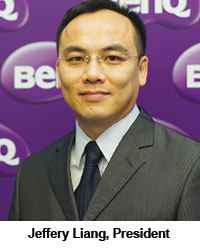
Jeffrey Liang: We have always been aware of India’s potential and hence it has been on the horizon. Since the past nine years we have focused on improving our products and services as well as our reach within the country. Today there is a growing demand for white boards with projectors in the education sector. We see this continuing and even booming. As our new product line grows, so will India’s importance as a market. In terms of business prospective, we expect to see the maximum growth in the education sector where there has been increased spending by both the government agencies as well as private institutions.
What kind of market share does BenQ have in the Indian technology and solutions industry?
Rajeev Singh: Overall BenQ enjoys a 26 percent share in India however we have 50 percent share in the education sector in the country. Education has been our strong point with us having covered as much as 67 percent of the private K-12 education segment. Our dominance in the private schools segment is evident by the fact that today two of every three schools providing ‘smart’ technological amenities use BenQ projectors. The private K-12 segment has helped us make the leap in terms of market share in India.
What is the company’s business model when working with private and government schools?
Rajeev Singh: In private education segment we have tie-ups with education system integrators like Ebix Smart Class, Next Education, Tata Class Edge, and Extra Marks who create their own content and use our hardware to disburse that information. Schools are offered a full solution that combines software as well as hardware with only BenQ or mainly BenQ products. We have tie-up with several other channel partners that have been working with stand-alone as well as chain of premium international and private schools.
We have also been involved with government schools, especially the K-12 education segment for some time. While we have been working with various state governments to make government classrooms tech ready, one of our biggest projects has been for the Kerala government where in the last two years we have installed BenQ projectors in 40,000 schools in the state making all 8th-12th grade government classrooms projector enabled. In addition to that we are working with other for similar initiatives in government schools in Andhra Pradesh, Telangana and Punjab currently.
How strong is the growth trajectory in the government education sector?
Rajeev Singh: India is poised to have double digit growth over the next five years so growth is there everywhere. Right now, it is seen more in the government sector because governments have started investing money in infrastructure up-gradation in the last couple of years. While it was the private segment that was growing fast earlier, the technological leap initiated in government schools across rural India is a big achievement for the country.
With India being the focus for BenQ, has the company created any India specific products?
Jeffrey Liang: Yes, we have. Our India specific projector has been created keeping in mind the needs of the rural areas which are prone to heavy dust and unstable power supply. Also in summers the ambient temperature in these places can go up to 50 degrees leading to high failure rate in products across all brands. Keeping these external limitations in mind we came up with a dedicated model that is dust resistant and can sustain the high ambient temperature without damage to its circuitry despite sudden electricity disruptions. BenQ’s low failure rate has ensured the brand remains the most reliable brand in the business with high customer satisfaction. That said we also provide the best service in the industry reaching even the smallest towns. All this has helped us become a dominant player in the education sector.
Will projectors continue to remain the mainstay amongst all your products for the education sector?
Jeffrey Liang: Projectors are fast moving but now we are also focusing on introducing interactive flat panels which are like touch panels because we believe they are the future of the classrooms. We offer several models in the flat panel category too and are already supplying them to chain schools. Rajeev Singh: We have introduced a new generation ‘smart projector’ variant recently. Smart projectors have an in-built android operating system suited specifically for the education sector. It is wireless, has various apps and is interactive which totally eliminates the need for a computing device since you can access content stored on cloud. These features not only improve the functionality of the product but also make it a future-proof product to use since despite the advent of new apps getting introduced, you are not limited by what the projector can do for you today. Whatever is the new app in the future, you will get new applications and can keep upgrading accordingly.